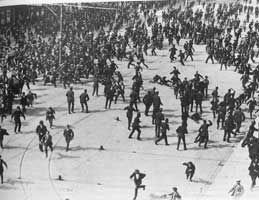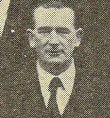Related Research Articles
A lockout is a work stoppage or denial of employment initiated by the management of a company during a labor dispute. In contrast to a strike, in which employees refuse to work, a lockout is initiated by employers or industry owners.

A dockworker is a waterfront manual laborer who loads and unloads ships.

The Irish Citizen Army, or ICA, was a small paramilitary group of trained trade union volunteers from the Irish Transport and General Workers' Union (ITGWU) established in Dublin for the defence of workers' demonstrations from the Dublin Metropolitan Police. It was formed by James Larkin, James Connolly and Jack White on 23 November 1913. Other prominent members included Seán O'Casey, Constance Markievicz, Francis Sheehy-Skeffington, P. T. Daly and Kit Poole. In 1916, it took part in the Easter Rising, an armed insurrection aimed at ending British rule in Ireland.

James Larkin, sometimes known as Jim Larkin or Big Jim, was an Irish republican, socialist and trade union leader. He was one of the founders of the Irish Labour Party along with James Connolly and William O'Brien, and later the founder of the Irish Worker League, as well as the Irish Transport and General Workers' Union (ITGWU) and the Workers' Union of Ireland. Along with Connolly and Jack White, he was also a founder of the Irish Citizen Army. Larkin was a leading figure in the Syndicalist movement.

The Dublin lock-out was a major industrial dispute between approximately 20,000 workers and 300 employers that took place in Dublin, Ireland. The dispute, lasting from 26 August 1913 to 18 January 1914, is often viewed as the most severe and significant industrial dispute in Irish history. Central to the dispute was the workers' right to unionise.

The Irish Transport and General Workers Union (ITGWU) was a trade union representing workers, initially mainly labourers, in Ireland.

The 1889 London dock strike was an industrial dispute involving dock workers in the Port of London. It broke out on 14 August 1889, and resulted in victory for the 100,000 strikers when they won their pay claim of sixpence per hour, the so-called "dockers' tanner". The industrial action also established strong trade unions amongst London dockers, one of which became the nationally important Dock, Wharf, Riverside and General Labourers' Union. The strike is widely considered a milestone in the development of the British labour movement, symbolising the growth of the New Unions of casual, unskilled and poorly paid workers, in contrast to the craft unions already in existence. The strike helped to draw attention to the problem of poverty in Victorian Britain and the dockers' cause attracted considerable public sympathy.

William O'Brien was a politician and trade unionist in Ireland. While rarely dominating the political spotlight, O'Brien was incredibly powerful and influential behind the scenes, maintaining a firm grip over Ireland's trade unions for many decades. Besides his leadership in the trade unions, O'Brien was a founder, alongside James Larkin and James Connolly, of the Labour Party of Ireland. In later years a rift formed between Larkin and O'Brien that would last the rest of their lives and often divide the labour movement in Ireland.
The Liverpool Dockers' dispute between dockers and their employers, Mersey Docks and Harbour Company (MDHC) and Torside Ltd, in Liverpool, England, lasted from 1995 to 1998. Although considered a strike, it was strictly a lockout as the employers, Mersey Docks, sacked the dockers for breach of contract when they refused to cross a picket line set up by their sacked Torside Limited colleagues. Initially, five Torside workers were dismissed following a dispute regarding overtime pay, who in turn formed a picket line that other dockers refused to cross in solidarity.

Sir James Sexton CBE was a British trade unionist and politician.
Industrial violence refers to acts of violence which occur within the context of industrial relations. These disputes can involve employers and employees, unions, employer organisations and the state. There is not a singular theory which can explain the conditions under which industrial conflicts become violent. However, there are a variety of partial explanations provided by theoretical frameworks on collective violence, social conflict and labor protest and militancy.

The Belfast Dock strike or Belfast lockout took place in Belfast, Ireland from 26 April to 28 August 1907. The strike was called by Liverpool-born trade union leader James Larkin who had successfully organised the dock workers to join the National Union of Dock Labourers (NUDL). The dockers, both Protestant and Catholic, had gone on strike after their demand for union recognition was refused. They were soon joined by carters, shipyard workers, sailors, firemen, boilermakers, coal heavers, transport workers, and women from the city's largest tobacco factory. Most of the dock labourers were employed by powerful tobacco magnate Thomas Gallaher, chairman of the Belfast Steamship Company and owner of Gallaher's Tobacco Factory.

Delia Larkin was a trade union organiser, journalist and actress, born to Irish parents in Liverpool, England. She was influenced by the activities of her brother, James Larkin, to move to Ireland, and was prominent during the 1913 Dublin Lockout. She was active in Irish trade union activities and was a founding secretary of the Irish Women Workers' Union.

Thomas Kennedy was an Irish Labour Party politician and trade union official.

The 2013 Hong Kong dock strike was a 40-day labour strike at the Kwai Tsing Container Terminal. It was called by the Union of Hong Kong Dockers (UHKD), an affiliate of the Hong Kong Confederation of Trade Unions (HKCTU) on 28 March 2013, against contracting companies to whom workforce management had been out-sourced by the Hongkong International Terminals Ltd. (HIT), subsidiary of Hutchison Port Holdings Trust (HPHT), which is in turn owned by Hutchison Whampoa Ltd (HWL), flagship company of Li Ka-shing, Hong Kong's richest man. The strike workers demanded better pay and working conditions. The strike ended on 6 May 2013 when the strikers accepted the offer of 9.8% pay rise. It was the longest running industrial action in Hong Kong in years. Public support and media attention on the strike were unprecedented in the city's history. Some observers marked this as the rejuvenation of political engagement.

Patrick Thomas Daly, known as P. T. Daly was an Irish trade unionist and politician.
Alice Brady (1898–1914) was a labour activist that was shot and killed during the 1913 Dublin Lock-out. She was shot accidentally in the hand by a worker and died two weeks later of tetanus. The worker was charged but acquitted of her murder. Members from the Irish Women Workers' Union used her funeral as a show of strength. A service was held on Saturday, 4 January 2014 to mark the centenary of Brady's funeral, and RTÉ One broadcast a documentary on the lockout involving descendants of participants and members of Brady's family.

Walter Carpenter was a prominent socialist and trade union organiser active in Ireland in the early 20th century.
The Leith dockers strike of 1913 was a strike of the dockers of Leith, Edinburgh, Scotland, from 26 June to 14 August 1913. The Dockers were part of the National Union of Dock Labourers (NUDL) union. The strike is said to have brought Leith to a standstill.

Thomas McCarthy was a British Irish trade unionist, who became prominent as a leader of dockers in England.
References
- ↑ "West awakens to worker rights". The Irish Times. Retrieved 29 February 2016.
- 1 2 "Sligo prelude to Great Lockout 1913 | An Phoblacht". www.anphoblacht.com. Retrieved 29 February 2016.
- ↑ "Sligo Dispute". www.nli.ie. Retrieved 29 February 2016.
- ↑ "News Archive 2013 - Jack O'Connor oration at Sligo Dock strike commemoration www.siptu.ie". SIPTU.
- ↑ "Events to Celebrate Anniversary of Sligo Dock Strike of 1913". The Cedar Lounge Revolution. Retrieved 29 February 2016.
- ↑ "Press Release" . Retrieved 29 February 2016.